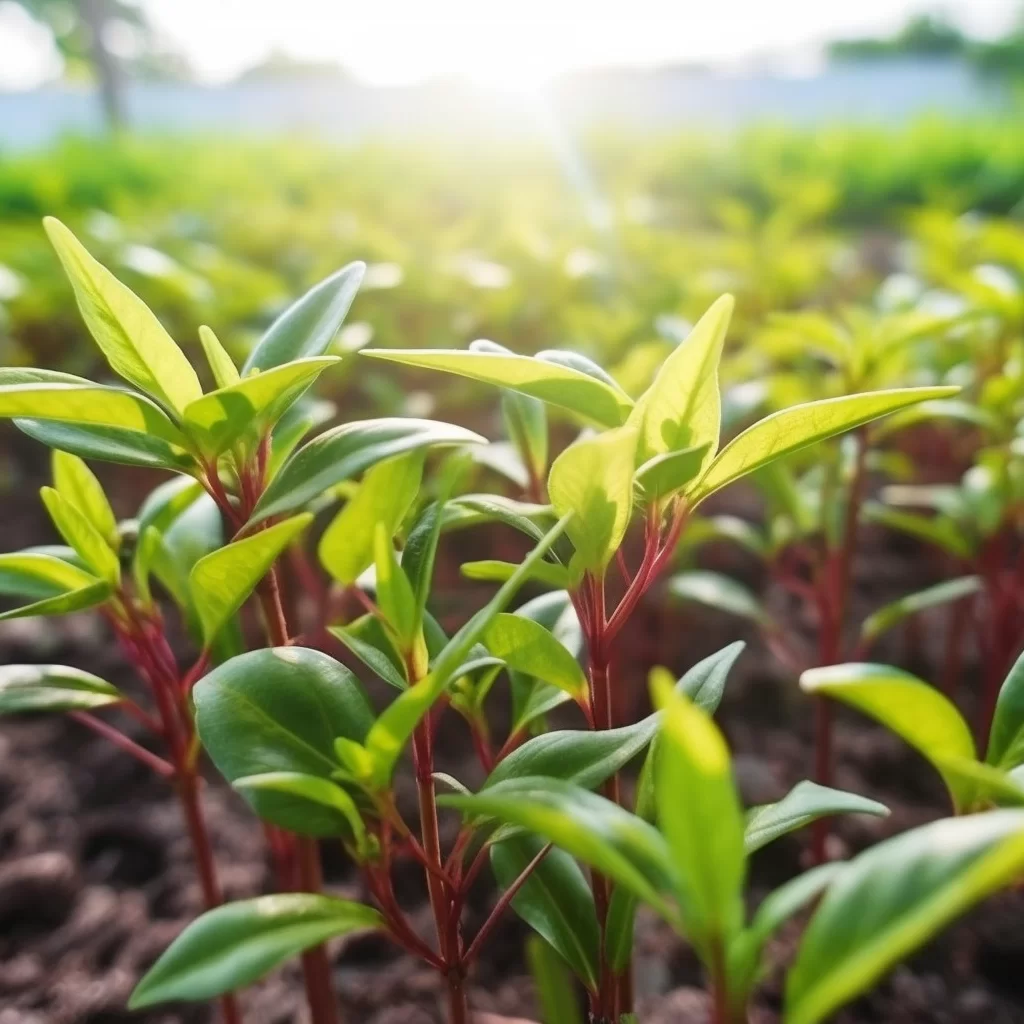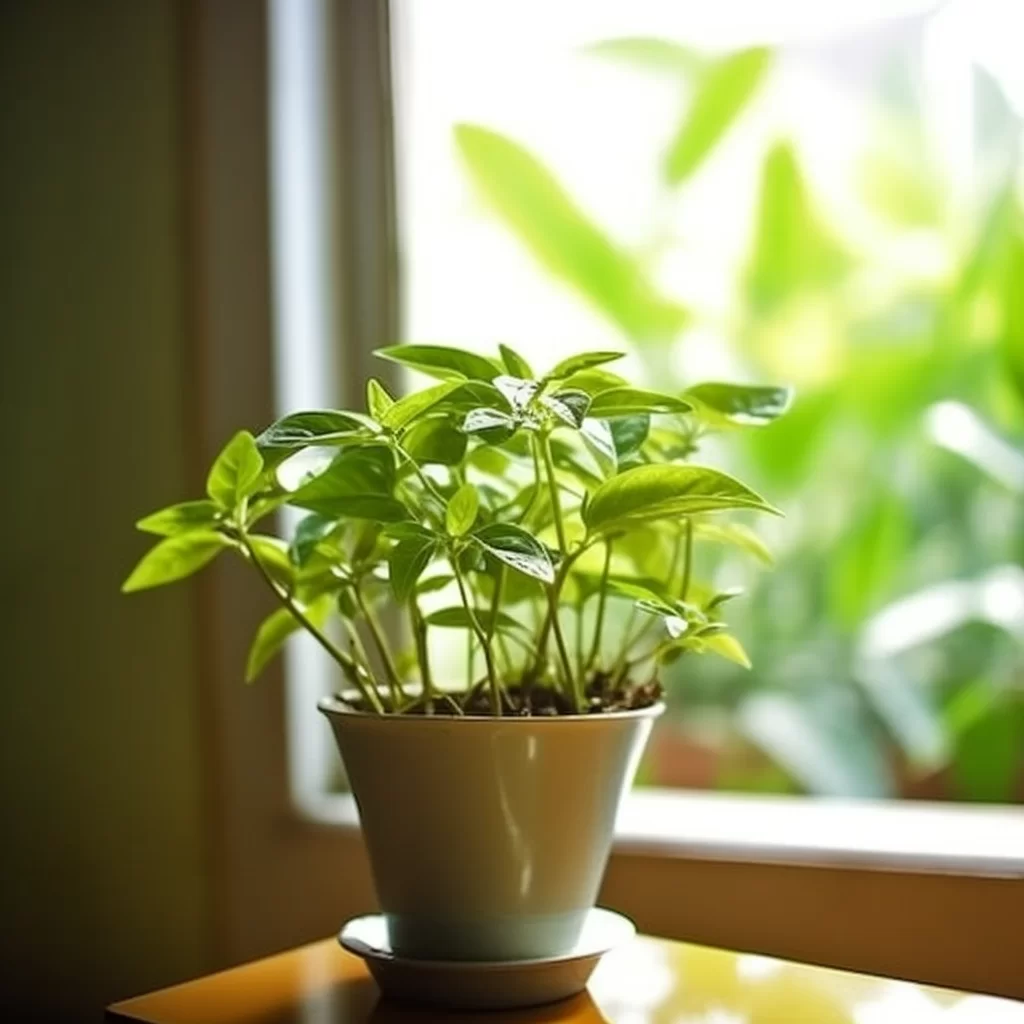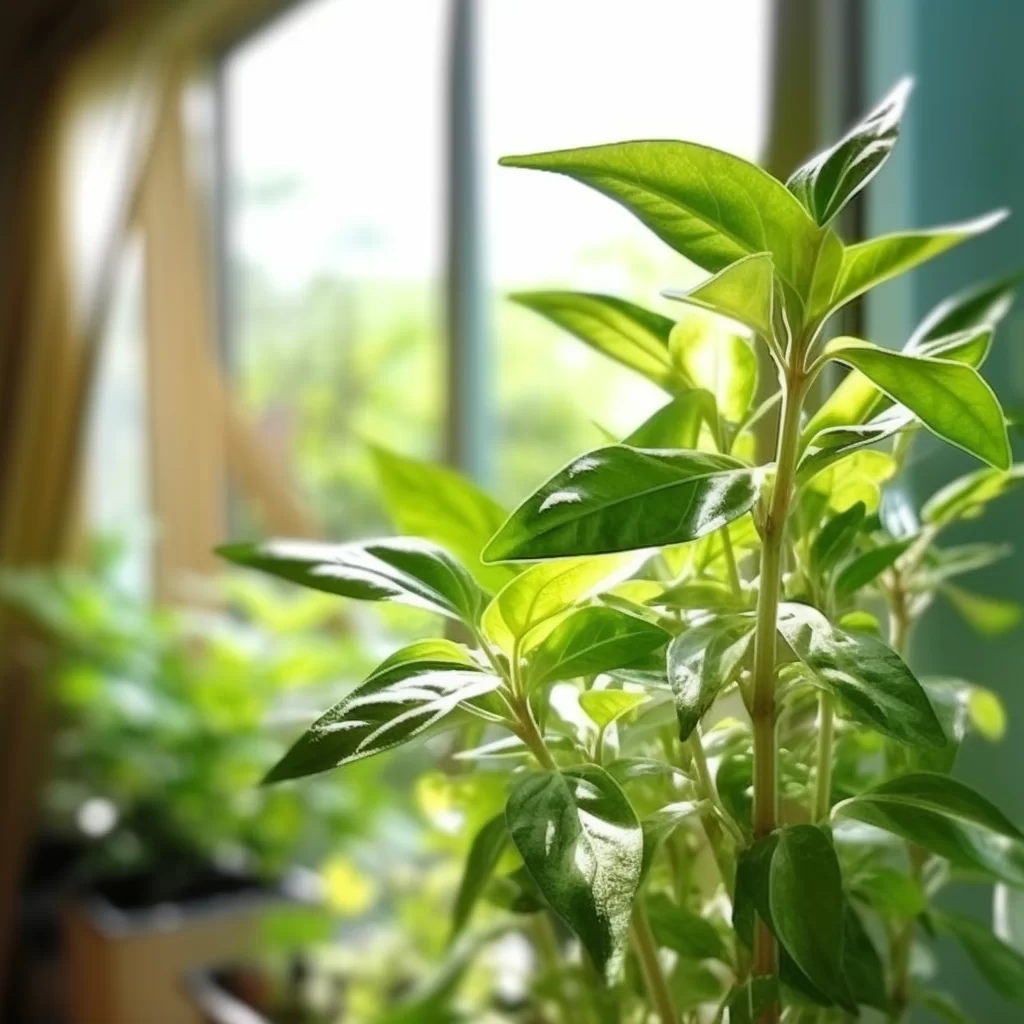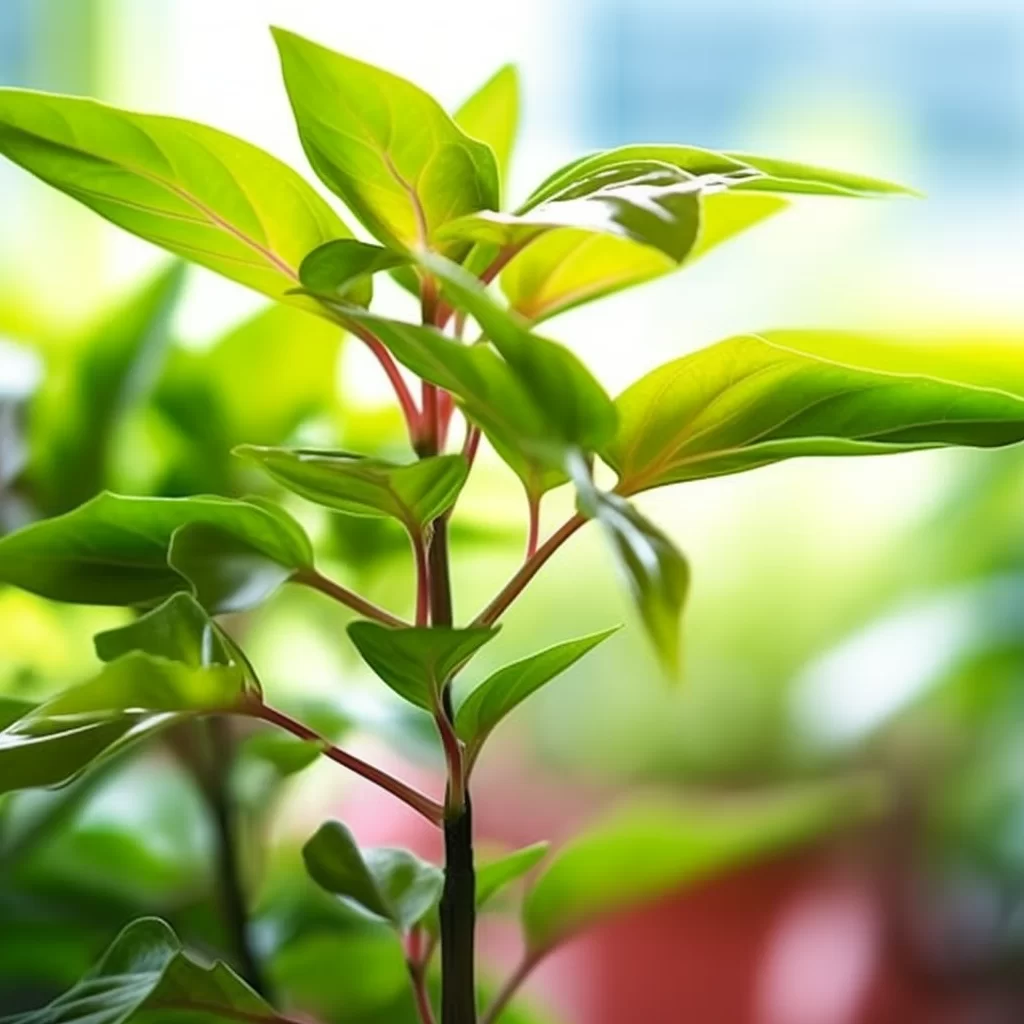Story of Day :
The Complete Guide to Growing and Caring for Thai Basil Plant: Tips and Tricks
Thai basil, scientifically known as Ocimum basilicum var.
thyrsiflora, is a popular herb that has long been a staple ingredient in Southeast Asian cuisines.
It is treasured for its unique flavor and aromatic properties that add depth and complexity to dishes like curries, stir-fries, and soups.
Not only does it enhance the taste of food, but it also has several health benefits such as improving digestion, reducing inflammation and aiding in stress relief.
Thai basil is an easy-to-grow plant that can be cultivated both indoors and outdoors with little effort.
It thrives in warm climates with plenty of sunshine and well-draining soil but can also survive in cooler temperatures with some care.
This makes it an excellent addition to any garden or kitchen windowsill for those who love growing their own herbs or want to add some greenery to their living spaces while having a fresh supply of Thai basil on hand at all times!
Getting Started with Thai Basil
If you’re interested in growing Thai basil, the first thing you’ll need to do is acquire either seeds or seedlings.
Luckily, these can be found at your local nursery or online if you prefer.
Once you’ve obtained them, it’s time to get started!  There are a few steps involved in successfully growing Thai basil.
There are a few steps involved in successfully growing Thai basil.
You’ll need to choose a location with plenty of sunlight and make sure the soil is well-draining.
Plant the seeds or seedlings as directed on the packaging and water regularly.
With some patience and care, your Thai basil plants will begin to thrive and provide fragrant leaves that are perfect for cooking with!
- Fill a small pot with nutrient-rich soil.
- Sow the seeds about ½ inch deep into the soil.
- Water thoroughly to moisten the soil.
- Place in a warm spot near sunlight (preferably near a window).
When growing your own plants from seeds, it’s important to keep an eye on their growth progress.
After sowing the seeds, you can expect to see sprouts within a week or two.
These sprouts will eventually grow into seedlings and when they reach a height of about six inches, they are ready to be transplanted into larger pots or outdoor containers if you plan on growing them outside.
This is an important step in the growth process as it allows your plants to continue thriving with more space for their roots and better access to nutrients.
Transplanting your seedlings also gives you the opportunity to monitor their growth more closely and adjust their environment as needed.
For example, if you notice that they are not getting enough sunlight or too much water in the current pot, you can move them somewhere that better suits their needs.
By taking good care of your seedlings during this crucial stage of development, you’re setting yourself up for success as they continue to grow into mature plants with strong roots and healthy leaves.
 If you’re a fan of Thai cuisine, then having your own Thai basil plant is a great way to ensure that you always have fresh herbs on hand for those delicious dishes.
If you’re a fan of Thai cuisine, then having your own Thai basil plant is a great way to ensure that you always have fresh herbs on hand for those delicious dishes.
Caring for a Thai basil plant is relatively easy, provided you give it the right conditions.
These plants prefer full sunlight and well-draining soil, so make sure to place them in an area that gets at least 6 hours of direct sunlight each day and use a potting mix that allows excess water to drain away.Watering is also important when caring for your Thai basil plant.
While they like moist soil, they don’t like to be waterlogged or sitting in standing water.
Water the plant regularly but allow the top inch of soil to dry out before watering again.
Regular pruning will help keep your plants bushy and encourage new growth while also preventing leggy stems from developing.
By following these simple steps, you can enjoy fresh Thai basil all year round! In addition to being relatively low maintenance, growing your own herbs has numerous benefits.
Not only does it allow you to save money by avoiding frequent trips to the grocery store but it also gives you more control over what goes into your food as well as access to more flavorful and nutrient-rich ingredients than what may be available in stores.
Plus, gardening can be a therapeutic pastime too! By taking care of something living and watching it thrive under our care can bring us joy and satisfaction – even if we don’t have green thumbs!
Thai basil is a versatile and aromatic herb that requires very little effort to grow.
However, if you want your plant to thrive, some basic care is necessary.
This includes providing it with ample sunlight, watering it regularly but not too much, and ensuring the soil is well-draining.
Thai basil also benefits from occasional fertilization, particularly during the growing season. Additionally, it is important to maintain your Thai basil plant by pruning back any dead leaves or stems as needed.
Additionally, it is important to maintain your Thai basil plant by pruning back any dead leaves or stems as needed.
Doing so will encourage new growth and help keep the plant healthy.
Overall, growing Thai basil can be a fun and rewarding experience with just a little bit of attention paid to its needs.
With proper care and maintenance, you can enjoy fresh herbs right at home for culinary use or simply for their pleasant fragrance in your garden or on your windowsill!
- Sunlight: Ensure that your plants receive at least six hours of direct sunlight every day; otherwise they may not grow as healthy as possible.
- Watering:The watering routine varies depending on weather conditions but be sure not
to overwater – too much water will cause root rot whereas too little water will cause leaves to turn yellow.Stick your finger into the soil, if it feels dry then water otherwise wait for a day or two and test again.
- Fertilizer:Thai basil plants thrive in nutrient-rich soil.
Use a good quality fertilizer to help them grow strong and healthy.
- Pruning:Regularly prune your Thai basil plant to encourage bushy growth and prevent flowering which can detract from the flavor of the leaves.
Thai Basil is a popular herb that is used in various dishes to add flavor and aroma.
However, it can be vulnerable to pests such as aphids, spider mites, and whiteflies.
These pests can cause damage to the leaves and stunt the growth of the plant if left untreated.
A quick solution for controlling these pesky insects is by using insecticidal soap that effectively eliminates them without harming the plant.Insecticidal soap is an organic solution made from natural ingredients that are safe for plants and humans.
It works by suffocating insects when sprayed on them, causing them to lose their ability to breathe and eventually die off.
In most cases, a quick spray of this soap on affected parts of Thai Basil will solve pest problems effectively.
By regularly inspecting Thai Basil for signs of infestation and taking prompt action with insecticidal soap when necessary, gardeners can keep their plants healthy while ensuring they remain pest-free throughout the growing season!
If you love Thai cuisine, then growing your own Thai basil plant can be a game-changer.
Not only is it easy to grow, but it also adds a unique flavor and aroma to your dishes that cannot be replicated with any other herb.
One of the benefits of growing your own Thai basil is its versatility in cooking.
It can be used as a fresh topping for salads or as an ingredient in stir-fries, curries, and soups.
Additionally, it is known for its medicinal properties such as reducing inflammation and aiding digestion.Another advantage of growing your own Thai basil plant is its cost-effectiveness.
Instead of purchasing small amounts from the grocery store every time you want to cook with it, having your own plant means you always have access to fresh leaves without spending extra money each time.
Plus, the convenience factor cannot be overstated – simply pick some leaves off the plant whenever needed! Overall, growing Thai basil at home not only enhances the taste and nutritional value of your meals but also saves you money in the long run.
If you’re looking for a new hobby that is both fulfilling and practical, consider growing your own herbs.
Not only will you have fresh and flavorful ingredients right at your fingertips, but there are also numerous benefits to be gained from starting an herb garden.
For starters, gardening has been shown to reduce stress and improve overall mental health.
Additionally, growing your own herbs means you can avoid harmful pesticides commonly used in commercial crops, resulting in healthier and more sustainable options for cooking and seasoning.Apart from the personal benefits of gardening, there are also many environmental advantages to consider.
By cultivating your own herbs at home, you reduce the need for transportation typically required to bring produce from farm to table.
This means less fuel consumption and fewer greenhouse gas emissions associated with large-scale agriculture practices.
Additionally, herb gardens provide habitat for beneficial insects like bees and butterflies that help pollinate other plants in the area which can lead to a more vibrant ecosystem overall.
So why not give it a try? Starting an herb garden is not only good for you but also great for the planet!
- You’ll have fresh herbs available for cooking whenever you need them.
- You’ll save money by not having to buy expensive store-bought herbs every time you want to use them in your dishes.
- Your home will smell amazing with fragrant herb scents wafting through it all day long!
After exploring the various aspects of the topic at hand, it is now time to draw a conclusion.
In light of the evidence presented, it can be inferred that there are several factors that contribute to the problem.
These include socio-economic status, cultural beliefs and attitudes towards certain issues, access to resources and education.
Additionally, there are several solutions that have been suggested such as increasing awareness through education programs and providing better access to resources for affected communities.Ultimately, addressing this issue will require collective effort from individuals and institutions alike.
It is imperative for government bodies and non-governmental organizations to work together in order to implement policies aimed at tackling these issues.
Meanwhile on an individual level we must work towards challenging societal norms which perpetuate these problems by advocating for change within our respective communities.
Through concerted efforts on all fronts we can hope to create a better future where everyone has equal opportunities regardless of social standing or cultural background.
Growing your own garden-fresh ingredients is a fulfilling and rewarding experience.
It can be challenging to keep up with the demands of gardening, but growing Thai basil is relatively easy if you follow some simple tips.
Firstly, ensure that your plant receives plenty of sunlight and water it appropriately according to a routine.
Secondly, fertilize when needed and regularly prune the plant to avoid flowers from blooming too quickly.
Lastly, be vigilant about pests that may attack your plant.By taking care of your Thai basil plant in this way, you’ll soon have an abundance of fresh leaves that are perfect for adding flavor and aroma into all kinds of Southeast Asian dishes whenever you need them.
The benefits of growing your own herbs are endless – not only do they taste better than store-bought ones, but they’re also free from harmful pesticides or chemicals that may affect our health negatively.
So why wait? Start growing your own Thai basil today and enjoy the many benefits this delicious herb has to offer!